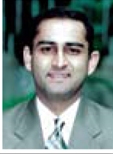Health Topics
-
Healthy Living
-
|
| |
|
Diarrhoea: A Common Childhood Problem
|
|
Dr Anupam Sibal and Dr Shravan Mehra
|
| (Continued...) |
| |
Treatment
As long as the child looks well and is taking adequate fluids and food, loose stools are not a great concern. Children should continue to eat a normal diet including formula or milk while they have mild diarrhoea. Breast-feeding should continue. If the baby’s abdomen appears bloated, the doctor must be consulted to discuss a temporary change in diet.
Oral Rehydration Therapy (ORT) is the cheap, simple and effective way to treat dehydration caused by diarrhoea. When diarrhoea occurs, essential fluids and salts are lost from the body and must be quickly replaced. ORT is the giving of fluid by mouth to prevent and/or correct the dehydration that is a result of diarrhoea. As soon as diarrhoea begins, treatment using home remedies to prevent dehydration must be started. An effective solution can be made using ingredients found in almost every household. These include fluids at home such as tea, soups, rice water and fruit juices to prevent dehydration, and the use of Oral Rehydration Solution (ORS) to treat dehydration.
Made up with clean water, ORS contains the main elements that are lost from the body during diarrhoea. It is effective in treating dehydration resulting from all types of acute diarrhoeal diseases. ORS should be given to the child every time a watery stool is passed. Antibiotics are only prescribed if the child has dysentery.
Each WHO ORS sachet is prepared in 200 ml of water. They are given in small frequent amounts, after each stool, with a target of obtaining adequate urine and preventing dehydration. In case of severe illness where there is evidence of moderate to severe dehydration, that is lack of water in the body, and also when there is vomiting and oral acceptance is poor - fluids may be needed to be given as a drip into the vein.
The child should eat as normally as possible
Do not ‘starve’ a child with infectious diarrhoea. This used to be advised but is now known to be wrong.
- Breast fed babies should continue to be breast feed. This is in addition to extra rehydration drinks.
- Bottle fed babies should be fed with their normal full strength feeds if they will take it. Again, this is in addition to extra rehydration drinks.
- Older children - offer some food every now and then. However, if he or she does not want to eat, that is fine. Drinks are more important and food can wait until the appetite returns.
Medication is not usually needed
Parents should not give drugs to stop diarrhoea to children. They sound attractive remedies, but are unsafe to give to children due to possible serious complications.
If symptoms are severe, or persist, a doctor may ask for a sample of the diarrhoea. This is sent to the lab to look for infecting germs (bacteria, parasites, etc). Sometimes an antibiotic or other treatment is needed, depending on if there is blood in the stool.
Can infectious diarrhoea be prevented?
Proper storage, preparation and cooking of food, and good hygiene helps to prevent infectious diarrhoea. In particular, always wash your hands, and teach children to wash theirs:
- After going to the toilet (and after changing nappies).
- Before touching food, and also, between handling raw meat and food ready to be eaten. (There may be some bacteria on raw meat.)
- After gardening.
- After playing with pets (healthy animals can carry certain harmful bacteria).
|
|
See a doctor if any of the following develop, or if any other symptoms occur that you are concerned about
- If you suspect dehydration is developing.
- Blood in the diarrhoea.
- Vomiting for more than one day, or diarrhoea that does not start to settle after 3 - 4 days.
- Pains that are getting worse.
- Drowsiness or confusion.
|
|
| |
 |
Dr Anupam Sibal is Group Medical Director and Senior Pediatrician, Apollo Hospitals Group. and Dr Shravan Mehra is Junior Consultant, Apollo Centre for Advanced Pediatrics, Indraprastha Apollo Hospitals.
|
|
| |
| |
|
|
| |
|